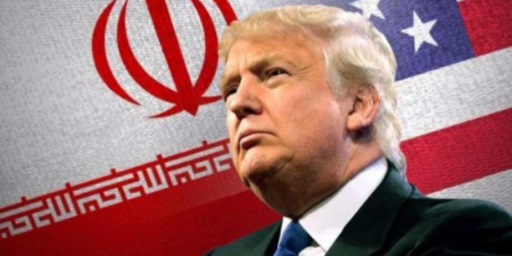Death of the Arab Nation-State?
Yoav Fromer expands the Iraq as Humpty Dumpty meme at TNR, perhaps even more soberly:
Despite utopian visions of an Arab nation-state with a modernized economy, social justice, and constitutional republicanism, the reality was sobering. Failed central planning, lack of capital, excessive military expenditures, and inadequate education–among other factors–cut short grandiose plans. The result plunged Arab countries into further poverty that bred further dissatisfaction, thus necessitating an even more authoritarian system to maintain order. Eventually, all that remained from the idealism of Arab nationalists was a single accomplishment (which, in retrospect, may have been the most important of them all): the formation of the state.
In Political Order in Changing Societies from 1968, Samuel P. Huntington made a Hobbesian argument for the essential role of political institutions and rule of law in the making of a state. As Huntington’s opening line makes clear, “The most important political distinction among countries concerns not their form of government but their degree of government.” And, appropriately, for all their failures, these Arab leaders consolidated power, centralized control of the state through complex bureaucracies, and effected the monopoly of violence that Max Weber had famously considered the defining character of the modern state. Saddam’s government was archetypal, to an extreme.
“If there is one great cause of the rise of Islamic Fundamentalism,” Newsweek‘s Fareed Zakaria once noted, “it is the total failure of political institutions in the Arab world.” Indeed, there is an obvious relationship between the decline of the secular Arab nation-state and the rise of militant Islam. Transnational terrorism networks and an Iranian-backed Shia resurgence have begun to fill in the void. In Iraq, these forces are a one-two punch: Sunni Al Qaeda affiliates and Shia fundamentalists like the Mahdi Army have created one of the most deadly environments in the world. In Lebanon, the fragile government of Prime Minister Fouad Siniora hinges upon the mercy of Hezbollah. And, in the Palestinian territories, a Hamas government financed by Iran has neutered President Mahmoud Abbas and edged the Palestinians to the brink of civil war. Even Syria, once a force to be reckoned with, has largely become a regional puppet jointly mastered by Iran and Hezbollah. Jordan and Egypt, which remain the most stable nation-states there, have become the exception, not the norm.
It’s true that the strongmen who once held these countries together were not exactly champions of Enlightenment liberal values–the ones the United States is supposedly fighting for in Iraq. But they were bulwarks against something worse, and it’s plain to see in Iraq what that is. Although Baghdad executed a murderous tyrant, it also ended–in Iraq–what few ancillary benefits that kind of ruler brought. Saddam’s demise could very well prove to be the beginning of the end for the Arab experiment with the nation-state.
That Arabs have not proven adept at forming political institutions, however, is hardly evidence that they are permanently incapable of same. After all, strongmen have every incentive to destroy nascent institutions; Saddam was archetypal here, too.
The Bush administration can be rightly faulted for overoptimism is thinking Iraq would magically become a modern democracy with Saddam’s ouster. Building institutions, especially in multi-ethnic states with little trust among factions, takes time. By the same token, the argument that all is hopeless because we haven’t succeeded after a little under four years is too pessimistic.
Despite significant cultural advantages when compared with Iraq, France took decades to emerge demonstrably better off from the Revolution. It doesn’t follow that they should have remained a monarchy for all time.





No, but it follows that another nation that invaded, killed the monarchs, and then did a crappy job building the rule of law from the bottom up ought to be viewed as incredibly irresponsible bordering on evil.
We didn’t depose the Emperor, stick a few troops here and there, and then hold national elections in Japan. In Germany, we didn’t maintain order with just a few troops and show off voters with purple fingers – in both cases, we built the rule of law from the ground up – not from the top down, and certainly not half-assed.
right on James. Thomas Barrnett states it takes at least 10-12 years for a nation state to fully develop
m1EK:
I’m not arguing that, on the present course, things will work out great. Merely that, even had we done it all as well as possible, the job might well not be over.
Further bolstering your France example, see also, for example, the histories of other developing nations in the Philippines, Kenya, and Malaysia. None has become a perfectly enlightened democracy, but then again, France hasn’t either, and all have found some surcease in their civil wars given enough time.
This analysis ignores the fact that Saddam himself was moving toward more reliance on Islamic fundamentalism to keep his regime in place. The secular Saddam who modeled his rule on Stalinist Soviet Union was giving way to a Saddam who increasingly emphasized his support of Islamic fundamentalism including funding terrorist attacks. The ‘beer in the parks on Saturday’ Saddam gave way to the mosque and palace building Saddam writing versus from the Koran with his own blood on the walls and empowering local councils to enforce Sharia law.
While not a democracy Dubai is growing by leaps and bounds and they’re Arab. The investment and tourism it’s drawing in is a sign they’re doing something right. That nation-state’s situation and experience may be too unique, but lessons could be learned.